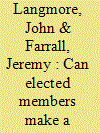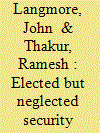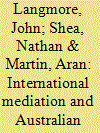|
|
|
Sort Order |
|
|
|
Items / Page
|
|
|
|
|
|
|
| Srl | Item |
| 1 |
ID:
144466


|
|
|
|
|
| Summary/Abstract |
The UN Charter gives the Security Council the extraordinary function of being responsible for international peace and security. Although the Permanent Five members are disproportionately powerful, there is nevertheless scope for elected members to influence the Council's decisionmaking processes during their short two-year terms. This article uses Australia's membership in 2013 and 2014 as a case study to examine why states seek election to the Council, means through which they can strengthen their influence, how they can navigate P5 power, how successful they are in achieving their objectives, and how the effectiveness of both elected members and the Council as a whole could be improved. Despite the substantial constraints facing elected members, those that are imaginative and industrious can nevertheless make influential contributions to achievement of the Council's purposes.
|
|
|
|
|
|
|
|
|
|
|
|
|
|
|
|
| 2 |
ID:
147224


|
|
|
|
|
| Summary/Abstract |
Many of the pressing policy challenges confronting the world's countries and peoples—climate change, pandemics, food and water scarcity, terrorism, financial meltdown—are international in origin and nature, global in scope and effects, and require concerted multilateral action led by the major powers. However, the responsibility for making policy and the authority to mobilize the requisite coercive resources to tackle the threats remain vested in sovereign states. Absent a world government, the order, stability, and predictability in international transactions comes from global governance operating as a patchwork of authority structures which produce generally adhered-to norms to regulate behavior, and layers of mechanisms to punish noncompliance.
|
|
|
|
|
|
|
|
|
|
|
|
|
|
|
|
| 3 |
ID:
151991


|
|
|
|
|
| Summary/Abstract |
In October 2012, Australia's parliamentary Joint Standing Committee on Foreign Affairs, Defence and Trade recommended that a mediation support unit should be created within the Australian Agency for International Development, a department now amalgamated with the Department of Foreign Affairs and Trade. The question is: Does Australia possess the motivation and capacity to implement active and effective international mediation by building the capacity of intermediaries to deploy various peacemaking methods to hasten de-escalation at different stages of a conflict? If not, is a mediation support unit an appropriate initiative to address this capability gap? This article draws on quantitative conflict data sets and an expert panel to conclude that Australia's track record demonstrates significant capacity to undertake international mediation, but that the mediation personnel and processes available to government are insufficiently resourced and coordinated to readily provide policymakers with accessible tools to undertake the diverse range of mediation strategies advocated by conflict scholars. While a mediation support unit would address some of these issues, at present it conflicts with the Department of Foreign Affairs and Trade's institutional philosophy based on diffused expertise.
|
|
|
|
|
|
|
|
|
|
|
|
|
|
|
|
|
|
|
|
|